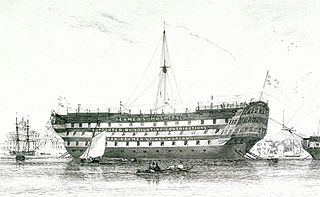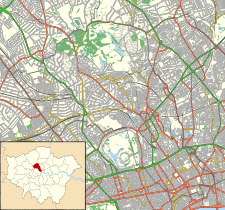
Sir Ronald Ross was a British medical doctor who received the Nobel Prize for Physiology or Medicine in 1902 for his work on the transmission of malaria, becoming the first British Nobel laureate, and the first born outside Europe. His discovery of the malarial parasite in the gastrointestinal tract of a mosquito in 1897 proved that malaria was transmitted by mosquitoes, and laid the foundation for the method of combating the disease.

Greenwich Hospital was a permanent home for retired sailors of the Royal Navy, which operated from 1692 to 1869. Its buildings, in Greenwich, London, were later used by the Royal Naval College, Greenwich and the University of Greenwich, and are now known as the Old Royal Naval College. The word "hospital" was used in its original sense of a place providing hospitality for those in need of it, and did not refer to medical care, although the buildings included an infirmary which, after Greenwich Hospital closed, operated as Dreadnought Seaman's Hospital until 1986.

St Thomas' Hospital is a large NHS teaching hospital in Central London, England. It is one of the institutions that compose the King's Health Partners, an academic health science centre. Administratively part of the Guy's and St Thomas' NHS Foundation Trust, together with Guy's Hospital, King's College Hospital, University Hospital Lewisham, and Queen Elizabeth Hospital, it provides the location of the King's College London GKT School of Medical Education.

The London School of Hygiene and Tropical Medicine (LSHTM) is a public research university in Bloomsbury, central London, and a member institution of the University of London that specialises in public health and tropical medicine.

HMS Dreadnought was a Royal Navy 98-gun second rate. This ship of the line was launched at Portsmouth at midday on Saturday, 13 June 1801, after she had spent 13 years on the stocks. She was the first man-of-war launched since the Act of Union 1800 created the United Kingdom of Great Britain and Ireland, and at her head displayed a lion couchant on a scroll bearing the Royal arms as emblazoned on the Standard.

Sir Patrick Manson was a Scottish physician who made important discoveries in parasitology, and was a founder of the field of tropical medicine. He graduated from University of Aberdeen with degrees in Master of Surgery, Doctor of Medicine and Doctor of Law. His medical career spanned mainland China, Hong Kong, Taiwan and London. He discovered that filariasis in humans is transmitted by mosquitoes. This is the foundation of modern tropical medicine, and he is recognized with an epithet "Father of Tropical Medicine". This also made him the first person to show pathogen transmission by a blood-feeding arthropod. His discovery directly invoked the mosquito-malaria theory, which became the foundation in malariology. He eventually became the first President of the Royal Society of Tropical Medicine and Hygiene. He founded the Hong Kong College of Medicine for Chinese and the London School of Hygiene & Tropical Medicine.
The Royal Society of Tropical Medicine and Hygiene, more commonly known by its acronym RSTMH, was founded in 1907 by Sir James Cantlie and George Carmichael Low. Sir Patrick Manson, the Society's first President (1907–1909), was recognised as "the father of tropical medicine" by his biographer. He passed the post on to Sir Ronald Ross, discoverer of the role of mosquitoes in the transmission of malaria.
The Seafarers Hospital Society, formerly the Seamen's Hospital Society, is a charity for people currently or previously employed by the British Merchant Navy and fishing fleets, and their families. It was established in 1821.

The Albert Dock Seamen's Hospital was a hospital provided by the Seamen's Hospital Society for the care of ex-members of the Merchant navy, the fishing fleets and their dependents.

The Eastman Dental Hospital was based on Gray's Inn Road until it co-located with the University College London ear, nose, throat, balance and hearing services on Huntley Street, London, as the Royal National ENT and Eastman Dental Hospitals in October 2019. The hospital continues to provide specialist dental treatment as well as ear, nose, throat, hearing, speech and balance services and is part of the University College London Hospitals NHS Foundation Trust.
University College London Hospitals NHS Foundation Trust (UCLH) is an NHS foundation trust based in London, United Kingdom. It comprises University College Hospital, University College Hospital at Westmoreland Street, the UCH Macmillan Cancer Centre, the Royal National ENT and Eastman Dental Hospitals, the Hospital for Tropical Diseases, the National Hospital for Neurology and Neurosurgery, the Royal London Hospital for Integrated Medicine and the Royal National Throat, Nose and Ear Hospital.

The London Chest Hospital, located in Bethnal Green in London, adjacent to Victoria Park, was a hospital with a national reputation for treatment of cardiac and pulmonary disease. Since 1999 it had been run by the Barts Health NHS Trust. It closed on 17 April 2015 as part of the creation of the Barts Heart Centre at St Bartholomew's Hospital, by consolidation of services from the London Chest Hospital and The Heart Hospital, part of University College London Hospital.

University College Hospital at Westmoreland Street, named The Heart Hospital until refurbished and renamed in 2015, was a specialist cardiac hospital located in London, United Kingdom until 2015. It is part of the University College London Hospitals NHS Foundation Trust and is closely associated with University College London (UCL). After the 2015 refurbishment, the hospital now provides thoracic surgery and urology services.

George Carmichael Low was a Scottish parasitologist.

Sir Alimuddin Zumla,, FRCP, FRCPath, FRSB is a British-Zambian professor of infectious diseases and international health at University College London Medical School. He specialises in infectious and tropical diseases, clinical immunology, and internal medicine, with a special interest in HIV/AIDS, respiratory infections, and diseases of poverty. He is known for his leadership of infectious/tropical diseases research and capacity development activities. He was awarded a Knighthood in the 2017 Queens Birthday Honours list for services to public health and protection from infectious disease. In 2012, he was awarded Zambia's highest civilian honour, the Order of the Grand Commander of Distinguished services - First Division. In 2023, for the sixth consecutive year, Zumla was recognised by Clarivate Analytics, Web of Science as one of the world's top 1% most cited researchers. In 2021 Sir Zumla was elected as Fellow of The World Academy of Sciences.

Edward James Seymour was an English physician and medical writer.
The Manson Medal, named in honour of Sir Patrick Manson, is the highest accolade the Royal Society of Tropical Medicine and Hygiene awards. Started in 1923, it is awarded triennially to an individual whose contribution to tropical medicine or hygiene is deemed worthy by the council.

Sir Philip HenryManson-Bahr, CMG, DSO, MA Cantab, MB BChir, MD, MRCP, FRCP was an English zoologist and physician known for his contributions to tropical medicine. He changed his birth name to Manson-Bahr after marrying Edith Margaret Manson, daughter of the doyen of tropical medicine Sir Patrick Manson. Following his father-in-law, he devoted much of his career to tropical medicine. He was a Consulting Physician, and held high offices at the London School of Hygiene & Tropical Medicine and at the London Hospital. He was knighted in 1941.

Clement Clapton Chesterman OBE was an English writer, humanitarian and physician. He was a medical missionary for the Baptist Missionary Society that served in the Belgian Congo, more specifically Yakusu. He was responsible for the establishment of a hospital, community-based dispensaries and training centres of medical auxiliaries. Chesterman's network of health dispensaries employed preventive medicine using the new drug tryparsamide to combat the prevalent issue of sleeping sickness in the area. His implementation of mass chemotherapy was extremely successful in eliminating the disease. Such success led to his methods being widely adopted in Africa, making Chesterman a prominent contributor to the field of tropical medicine. In 1974 he was knighted by Queen Elizabeth.

Andrew Davidson,, was a Scottish physician who worked as a medical missionary, tropical disease researcher and medical facility administrator in Madagascar and Mauritius. He was an early advocate for the teaching of tropical medicine in British medical schools, and was the author of many publications, mostly related to aspects of tropical medicine.

















